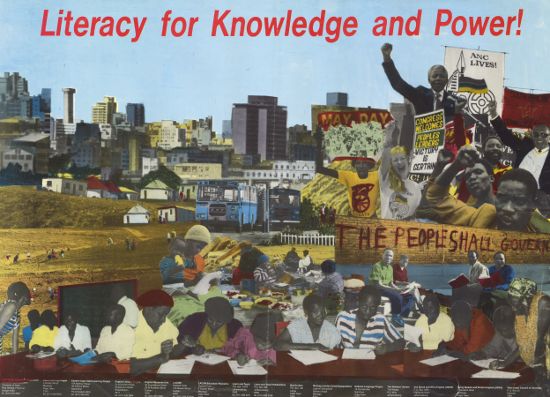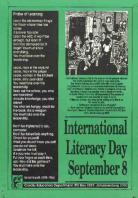"Learn the elementary things! ... Learn the ABC. It won't be enough, but learn it! Don't be dismayed by it ... Don't be frightened to ask, comrade! Don't be talked into anything. Check for yourself! What you do not know yourself you do not know."
- Bertoldt Brecht (See International Literacy Day Poster, COSATU Education Department, SAHA Poster Collection, AL2446_1118)
International Literacy Day was established in 1965 by the United Nations General Assembly as a way of drawing attention to the global problem of illiteracy. It was first commemorated on 8 September 1966. In December 2001, the United Nations General Council proclaimed the United Nations Literacy Decade (2003-2012). Literacy Day remains a focal point of this campaign.
Literacy is recognised as the ability to read and write, as well as comprehension of basic numeracy skills. According to Kofi Annan, literacy "unlocks the door to learning throughout life...and opens the way for democratic participation and active citizenship." The ability to read, write and count is not a privilege or luxury. It is a fundamental human right, at the root of knowledge.
In South Africa, it is estimated that more than half of the population have not received an adequate level of education, with over five million who remain entirely illiterate. The vast majority of illiteracy is found in developing countries, and more than one quarter of the global adult population remains illiterate. Literacy, the basis for any education, enables a vastly improved quality of life.
 Education Campaigns for Literacy Day
Education Campaigns for Literacy Day
1Goal :: Launched in April 2010, 1GOAL strives to make education a reality for all, particularly children who remain deprived of an education through ensuring sufficient funds are available and that policies exist to facilitate improved access to education.
Learn more about 1GOAL.
Equal Education :: This movement of learners, parents, teachers and community members works for quality and equality in South African education. Through analysis and activism, Equal Education seeks to address the legacy of the apartheid-era education system, which entrenched unequal systems of learning in South African schools.
Learn more about Equal Education's Campaign for School Libraries.
Literacy and Education in SAHA Collections
AL2418 :: The Progressive Teachers' League Collection
The Progressive Teachers' League (PTL) was formed in 1986 in Lenasia. It was formed by progressive teachers who were concerned with the education crisis and the ineffectiveness of the Teachers' Association of South Africa (TASA). It largely organised teachers who fell under the Department of Education and Culture, House of Delegates. PTL was in its short life-span mainly based in Lenasia, although branches were established in Johannesburg Central, Actonville and Laudium. The thrust of PTL activity therefore occurred in Lenasia. From its inception PTL worked closely with other progressive teacher and education organisations in the country. The PTL was also a leading participant in the National Teacher Unity Forum which culminated in the launch of the South African Democratic Teachers' Union (SADTU). Upon the formation of SADTU, PTL ceased to exist.
AL2606 :: The Congress of South African Writers (COSAW) Collection
The Congress of South African Writers (COSAW) was launched in July 1987. It arose out of the need for a grassroots writer's organisation that sought to promote literature and redress the imbalances of Apartheid education. COSAW organises literary events, conducts research, liaises with literacy organisations, establishes writing groups, facilitates workshops for aspirant writers from disadvantaged communities and publishes materials.






 Education Campaigns for Literacy Day
Education Campaigns for Literacy Day 


